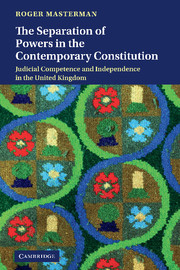 The Separation of Powers in the Contemporary Constitution
The Separation of Powers in the Contemporary Constitution Book contents
- Frontmatter
- Contents
- Acknowledgements
- Table of cases
- Introduction
- PART I Separation of powers, the Human Rights Act and the European Convention on Human Rights
- 1 A doctrine of uncertain scope and application
- 2 The Human Rights Act 1998 and the separation of powers
- 3 The Strasbourg influence
- PART II Judicial engagement with the ‘political’ branches
- PART III The creative powers of courts
- PART IV The separation of the judicial branch
- Select bibliography
- Index
3 - The Strasbourg influence
from PART I - Separation of powers, the Human Rights Act and the European Convention on Human Rights
Published online by Cambridge University Press: 10 January 2011
- Frontmatter
- Contents
- Acknowledgements
- Table of cases
- Introduction
- PART I Separation of powers, the Human Rights Act and the European Convention on Human Rights
- 1 A doctrine of uncertain scope and application
- 2 The Human Rights Act 1998 and the separation of powers
- 3 The Strasbourg influence
- PART II Judicial engagement with the ‘political’ branches
- PART III The creative powers of courts
- PART IV The separation of the judicial branch
- Select bibliography
- Index
Summary
Introduction
The influence of the Convention and the Strasbourg case law on the domestic separation of governmental powers has a number of distinct dynamics. As Clapham has noted, ‘[t]he European Court of Human Rights is not seeking to harmonize constitutional traditions but to ensure international protection for the rights contained in the Convention’. Yet the influence of the jurisprudence of the European Court of Human Rights quite clearly brings with it a strong adherence to the values of constitutionalism and limited government. This is most obviously evident in the commitment shown by the Convention to the rule of law. The Convention therefore reflects the spirit of checked and limited government, even if it prescribes no specific template for how such an objective might be achieved. So while the European Court of Human Rights has been able to consistently state that the Convention does not demand the maintenance of any specific ‘theoretical constitutional concepts as such’, the notion of the separation of executive, legislative and judicial power can also be said to have achieved a certain prominence in the case law of the Strasbourg court. For example, in Stafford v. United Kingdom, the ‘growing importance’ of the notion of the separation of governmental powers was noted, while in Benjamin and Wilson v. United Kingdom the idea was referred to as being ‘fundamental’. More specifically, perhaps, the Strasbourg jurisprudence has seen the separation of judicial and executive power acknowledged as a ‘legitimate aim’ to be pursued by domestic authorities.
- Type
- Chapter
- Information
- The Separation of Powers in the Contemporary ConstitutionJudicial Competence and Independence in the United Kingdom, pp. 60 - 86Publisher: Cambridge University PressPrint publication year: 2010


